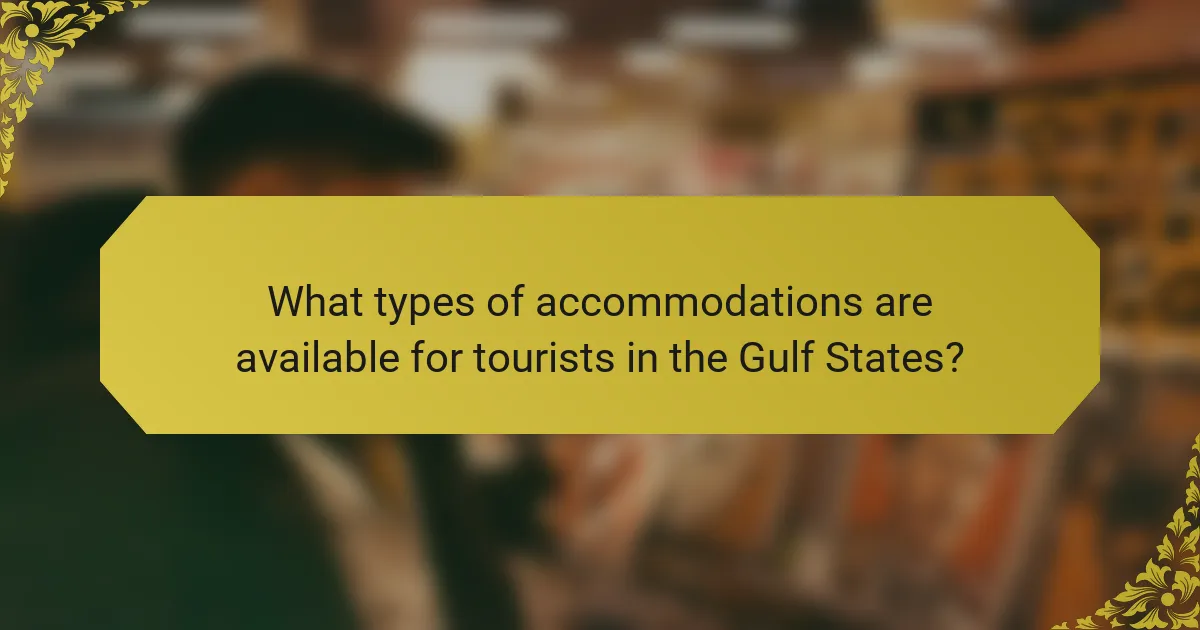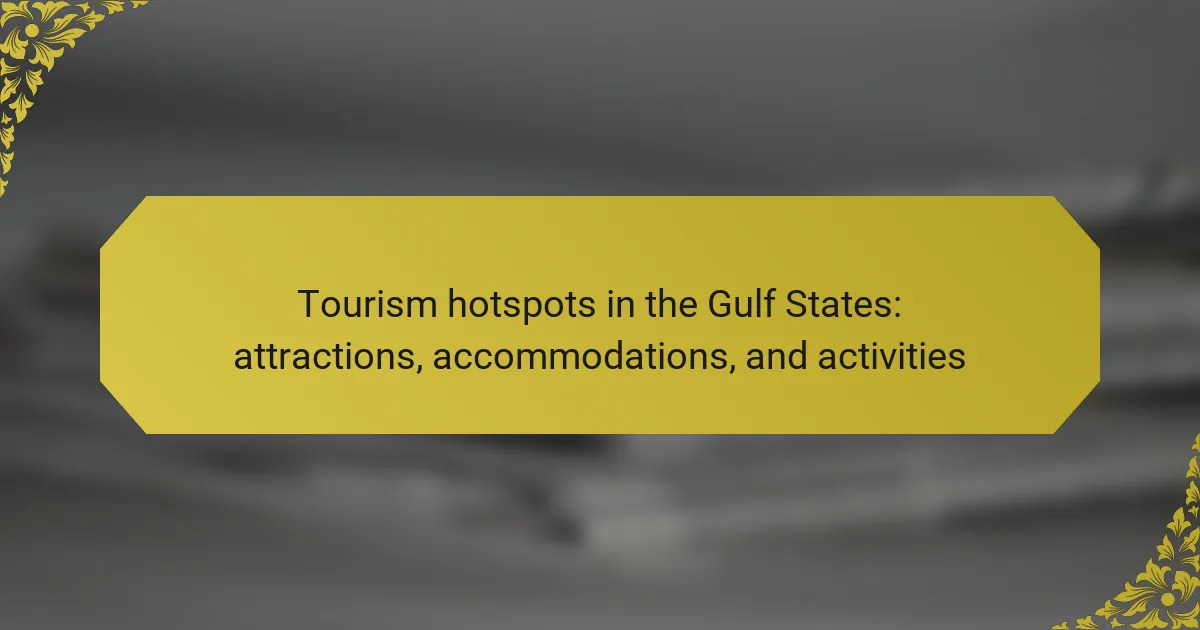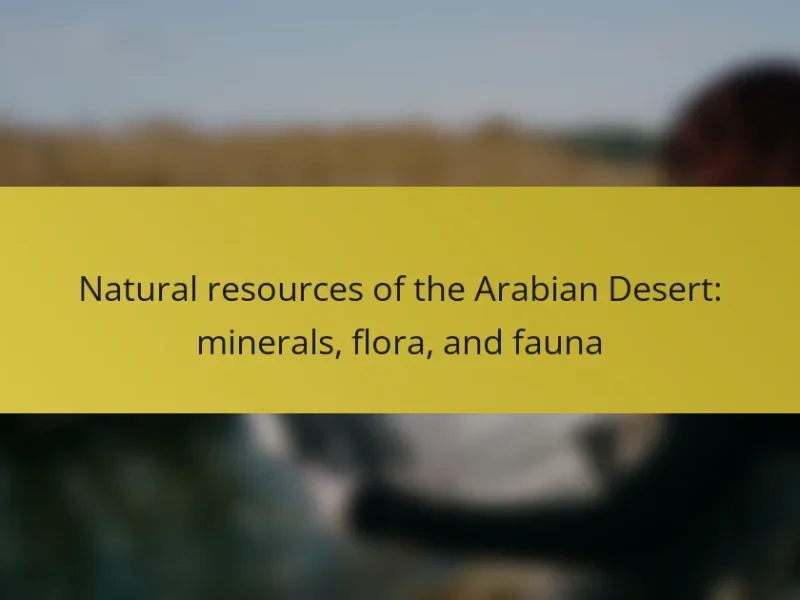
What are the key tourism hotspots in the Gulf States?
The key tourism hotspots in the Gulf States include Dubai, Abu Dhabi, Doha, Muscat, and Manama. Dubai is famous for its iconic Burj Khalifa and luxurious shopping malls. Abu Dhabi features the stunning Sheikh Zayed Grand Mosque and the Louvre Abu Dhabi. Doha is known for its modern skyline and cultural attractions like the Museum of Islamic Art. Muscat offers beautiful beaches and the historic Sultan Qaboos Grand Mosque. Manama is recognized for its vibrant markets and the Bahrain National Museum. Each of these locations attracts millions of visitors annually, contributing to the region’s growing tourism industry.
How do cultural influences shape tourism in the Gulf States?
Cultural influences significantly shape tourism in the Gulf States. The region’s rich heritage attracts visitors seeking authentic experiences. Traditional customs, such as hospitality and cuisine, play a vital role in tourism. Festivals, like Eid and the Dubai Shopping Festival, draw large crowds and showcase local culture. Architectural styles reflect Islamic traditions, enhancing the aesthetic appeal of tourist sites. Cultural events, such as art exhibitions and music festivals, promote local talent and engage tourists. The Gulf States’ unique blend of modernity and tradition creates diverse attractions. According to the Gulf Cooperation Council, cultural tourism contributes substantially to the economy.
What unique cultural attractions can visitors explore?
Visitors can explore unique cultural attractions such as the Sheikh Zayed Grand Mosque in Abu Dhabi. This mosque is known for its stunning architecture and intricate designs. It is one of the largest mosques in the world, accommodating thousands of worshippers. Another attraction is the Museum of Islamic Art in Doha. This museum houses a vast collection of Islamic artifacts and art. The museum’s design is a masterpiece, reflecting Islamic architecture. Additionally, the Bahrain Fort offers insights into the region’s ancient history. This UNESCO World Heritage site dates back to the 16th century. Visitors can also experience the traditional souks, like Souq Waqif in Doha. These markets showcase local crafts, spices, and cuisine, providing a glimpse into the region’s culture.
How do local festivals enhance the tourism experience?
Local festivals enhance the tourism experience by providing unique cultural insights. They showcase local traditions, food, and art. Tourists engage with the community through immersive activities. Festivals often feature performances that attract visitors. This boosts local economies through increased spending. According to a study by the World Tourism Organization, cultural events can raise tourist numbers significantly. Festivals also create memorable experiences that encourage repeat visits. Overall, they enrich the travel experience by fostering connections between tourists and locals.
What natural attractions draw tourists to the Gulf States?
The Gulf States attract tourists with stunning natural attractions. These include beautiful beaches, desert landscapes, and unique wildlife. The white sandy beaches of the Gulf Coast are renowned for their crystal-clear waters. Destin, Florida, is famous for its scenic coastline and outdoor activities. The Gulf Islands National Seashore offers pristine natural beauty and diverse ecosystems. The region’s deserts, such as the Arabian Desert, showcase vast dunes and unique geological formations. Wildlife enthusiasts visit the Gulf States for birdwatching and marine life. The wetlands of Louisiana are home to rich biodiversity and unique ecosystems. These natural attractions contribute significantly to the tourism economy in the Gulf States.
Which beaches are considered the best for relaxation and activities?
The best beaches for relaxation and activities in the Gulf States include Jumeirah Beach in Dubai, Qatar’s Katara Beach, and Bahrain’s Al Dar Island. Jumeirah Beach offers stunning views and numerous water sports options. Katara Beach features cultural events and family-friendly activities. Al Dar Island is known for its serene environment and recreational facilities. These beaches provide a mix of relaxation and engaging activities for visitors.
How do national parks and reserves contribute to eco-tourism?
National parks and reserves significantly contribute to eco-tourism by providing natural habitats and diverse ecosystems. These areas attract visitors interested in outdoor activities such as hiking, wildlife observation, and photography. Eco-tourism in national parks promotes conservation efforts, as entrance fees often fund preservation initiatives. For instance, the Gulf States’ parks protect unique flora and fauna, enhancing biodiversity. They also create economic opportunities for local communities through sustainable tourism practices. Studies show that eco-tourism can reduce environmental impact while supporting local economies, making it a vital aspect of national parks’ contributions.

What types of accommodations are available for tourists in the Gulf States?
The types of accommodations available for tourists in the Gulf States include hotels, resorts, serviced apartments, and hostels. Hotels range from luxury five-star options to budget-friendly choices. Resorts often feature amenities like pools, spas, and private beaches. Serviced apartments provide a home-like atmosphere with kitchen facilities. Hostels cater to budget travelers and offer shared dormitory-style rooms. The Gulf States also have unique accommodations such as desert camps and eco-lodges. These options cater to diverse preferences and budgets. The variety enhances the overall travel experience in the region.
How do luxury hotels differ from budget options in the region?
Luxury hotels offer premium services and amenities that budget options do not provide. Luxury accommodations typically include features such as fine dining, spa services, and personalized concierge services. In contrast, budget hotels focus on basic lodging with minimal amenities.
Luxury hotels often have prime locations near major attractions, enhancing guest experiences. Budget options may be situated further from tourist hotspots, requiring additional transportation.
The average price for luxury hotels can exceed $300 per night, while budget hotels often range from $50 to $150 per night.
Additionally, luxury hotels maintain high standards of customer service, often employing a higher staff-to-guest ratio. Budget hotels may have fewer staff members, resulting in limited personalized service.
Overall, the differences lie in the quality of experience, service, and pricing between luxury and budget accommodations in the region.
What amenities can travelers expect in five-star hotels?
Travelers can expect luxurious amenities in five-star hotels. These amenities typically include spacious rooms with high-end furnishings. Guests often enjoy 24-hour room service and personalized concierge services. Five-star hotels usually feature fine dining restaurants with gourmet cuisine. Many have full-service spas offering a range of treatments. Fitness centers with state-of-the-art equipment are commonly available. Swimming pools, often with stunning views, are a standard offering. Additionally, complimentary Wi-Fi and premium toiletries enhance the guest experience.
Which budget-friendly options provide the best value?
Budget-friendly options that provide the best value in Gulf States tourism include affordable accommodations, free attractions, and low-cost activities. Budget hotels and hostels in cities like Dubai and Doha offer competitive rates without sacrificing comfort. Many cultural sites, such as museums and historical landmarks, have no entry fees or minimal charges. Public beaches and parks are often free and provide great leisure opportunities. Local markets and street food vendors offer delicious meals at low prices, enhancing the travel experience without overspending. Additionally, public transportation is affordable, making it easy to explore various attractions efficiently.
What unique lodging experiences can tourists find?
Tourists can find unique lodging experiences such as desert camps, underwater hotels, and luxury treehouses. Desert camps offer immersive experiences in the Arabian desert, featuring traditional Bedouin-style tents and cultural activities. Underwater hotels provide a one-of-a-kind stay beneath the sea, showcasing marine life through glass walls. Luxury treehouses present an elevated perspective, often surrounded by lush landscapes. These lodging options reflect the diverse environments and cultural richness of the Gulf States. Each experience enhances the travel adventure by providing unforgettable memories and unique perspectives.
How do traditional guesthouses reflect local culture?
Traditional guesthouses reflect local culture through architecture, decor, and hospitality practices. They often showcase regional building materials and styles, such as mud bricks or palm fronds, which are common in Gulf States. The interior design typically features local crafts, textiles, and art, emphasizing cultural heritage. Additionally, traditional guesthouses often serve local cuisine, allowing guests to experience authentic flavors and cooking methods. The hospitality practices in these guesthouses, including welcoming rituals and communal dining, highlight the importance of family and community in local culture. Historical significance also plays a role, as many guesthouses are situated in heritage sites, connecting visitors to the region’s past. Overall, traditional guesthouses serve as living representations of the local culture, preserving and promoting its unique attributes.
What are the benefits of staying in eco-friendly accommodations?
Staying in eco-friendly accommodations reduces environmental impact. These accommodations often utilize sustainable practices such as energy-efficient systems. They typically conserve water through low-flow fixtures and rainwater harvesting. Eco-friendly lodgings may also use renewable energy sources like solar or wind power. Many of these establishments prioritize local sourcing for food and supplies. This supports local economies and reduces carbon footprints associated with transportation. Studies show that eco-friendly practices can lead to lower operating costs for businesses. Guests may also enjoy healthier indoor environments due to the use of non-toxic materials.

What activities can tourists engage in while visiting the Gulf States?
Tourists can engage in various activities while visiting the Gulf States. Popular activities include exploring cultural heritage sites, such as museums and historic forts. Tourists can also enjoy shopping in traditional souks and modern malls. Outdoor activities like desert safaris and dune bashing are common. Water sports, including snorkeling, scuba diving, and jet skiing, attract many visitors. Tourists often participate in local festivals and events that showcase regional traditions. Culinary experiences, such as trying local cuisine and dining at luxury restaurants, are also popular. Additionally, some tourists take part in wellness retreats and spa experiences. These activities reflect the diverse offerings of the Gulf States, appealing to various interests.
What adventure sports are popular among tourists?
Popular adventure sports among tourists include scuba diving, desert safaris, and kite surfing. Scuba diving is favored for exploring vibrant coral reefs and marine life in the Gulf waters. Desert safaris offer thrilling experiences such as dune bashing and camel riding across vast sand dunes. Kite surfing attracts enthusiasts due to favorable wind conditions along the coastline. These activities are well-supported by local tour operators, enhancing accessibility for tourists. Adventure sports contribute significantly to the tourism economy in the Gulf States.
How can visitors experience water sports in the Gulf region?
Visitors can experience water sports in the Gulf region through various activities such as jet skiing, parasailing, and scuba diving. Many coastal cities offer rental services for water sports equipment. Popular locations include Dubai, Abu Dhabi, and Doha. These cities host professional instructors for guided experiences. Numerous resorts provide water sports packages for guests. The region’s warm climate supports year-round water activities. Additionally, events such as water sports competitions attract enthusiasts. Access to pristine beaches enhances the overall experience.
What desert activities are must-tries for thrill-seekers?
Must-try desert activities for thrill-seekers include dune bashing, sandboarding, and camel trekking. Dune bashing involves driving at high speeds over sand dunes in a 4×4 vehicle. This activity offers an adrenaline rush and stunning desert views. Sandboarding allows participants to glide down dunes on a board, similar to snowboarding. It is popular in regions like Dubai and Abu Dhabi. Camel trekking provides a unique experience of exploring the desert landscape on a camel. These activities are often offered as part of desert safari tours, which include guides and safety equipment.
What family-friendly attractions are available?
Family-friendly attractions in the Gulf States include theme parks, aquariums, and cultural centers. Popular theme parks like Yas Island in Abu Dhabi offer thrilling rides and entertainment for all ages. Aquariums, such as The Lost Chambers Aquarium in Dubai, feature diverse marine life and interactive exhibits. Cultural centers, like the Sheikh Mohammed Centre for Cultural Understanding, provide educational experiences about local traditions. These attractions cater to families with activities that engage children and adults alike. Each location emphasizes safety and accessibility, ensuring a welcoming environment for visitors.
Which amusement parks are top-rated for families?
Top-rated amusement parks for families include Universal Studios Orlando, Disneyland Resort in California, and Walt Disney World in Florida. These parks offer a variety of attractions suitable for all ages. Universal Studios Orlando features immersive experiences based on popular movies. Disneyland Resort provides classic rides and character meet-and-greets. Walt Disney World is known for its vast selection of entertainment options. According to TripAdvisor, these parks consistently receive high ratings from family visitors. Families appreciate the variety of shows, dining options, and accommodations available at these locations.
How do cultural centers and museums cater to children?
Cultural centers and museums cater to children through interactive exhibits and educational programs. They design hands-on activities that engage young visitors. Many institutions offer guided tours specifically for children. These tours often include storytelling and age-appropriate explanations. Workshops and art classes are also common, allowing children to create their own art. Special events like family days encourage participation from the whole family. Additionally, many museums provide child-friendly resources, such as scavenger hunts. These initiatives enhance learning and make visits enjoyable for children.
What tips should travelers consider for a successful trip to the Gulf States?
Travelers should consider local customs and dress codes for a successful trip to the Gulf States. Respecting cultural norms is crucial. For example, modest clothing is expected in public spaces. Women should cover their shoulders and knees. Men should avoid wearing shorts in certain areas. Additionally, travelers should stay hydrated due to the hot climate. The temperature often exceeds 100°F (38°C) in summer months. Planning activities during cooler parts of the day is advisable. Travelers should also familiarize themselves with local cuisine. Trying traditional dishes enhances the cultural experience. Finally, booking accommodations in advance is important, especially during peak tourist seasons. This ensures better options and prices.
How can tourists plan their itinerary effectively?
Tourists can plan their itinerary effectively by researching destinations and prioritizing attractions. They should identify key sights and experiences they want to include. Creating a daily schedule helps allocate time efficiently. Utilizing travel apps can assist in organizing plans and navigating routes. Booking accommodations in advance secures preferred lodging. Checking local events ensures tourists don’t miss unique experiences. Finally, allowing flexibility in the itinerary accommodates unexpected opportunities. Effective itinerary planning enhances the overall travel experience.
What cultural etiquette should visitors be aware of?
Visitors should be aware of several cultural etiquette practices in the Gulf States. Respect for local customs and traditions is paramount. Dress modestly, especially in public spaces and religious sites. Men and women should avoid wearing revealing clothing. Greeting locals with a handshake is common, but wait for the other person to initiate contact. It is important to use the right hand for giving and receiving items, as the left hand is considered unclean. Public displays of affection are frowned upon and should be avoided. Visitors should also refrain from discussing sensitive topics such as politics and religion. Observing local prayer times and being respectful during these moments is essential. These practices reflect the values and norms of the region, ensuring a positive experience for visitors.
Tourism hotspots in the Gulf States include key cities such as Dubai, Abu Dhabi, Doha, Muscat, and Manama, each offering unique attractions like architectural marvels, cultural sites, and stunning natural landscapes. The article explores how cultural influences shape tourism, highlighting festivals and local customs that enhance visitor experiences. It also examines various accommodations, from luxury hotels to eco-friendly lodgings, and outlines popular activities, including adventure sports and family-friendly attractions. Additionally, practical tips for travelers on etiquette and itinerary planning are provided to ensure a successful trip to the region.


